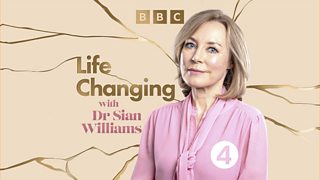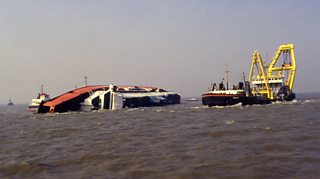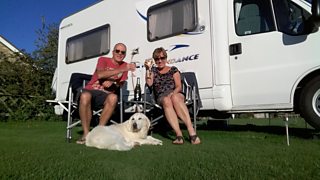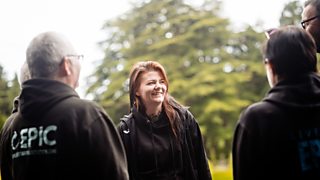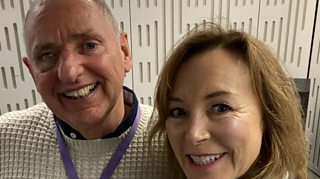My brain injury nearly killed me, but it won’t stop me sailing

When keen sailor Robin Webb was brutally attacked on the Caribbean island of Antigua, his injuries were consistent with being dropped from a three-storey building.
His new fiancé, Liz, faced an agonising decision over how to transport him to hospital for major surgery, as Robin's life hung in the balance.
After an astonishing recovery, the ordeal has given Robin a new outlook on life - and he hopes to conquer the world's most challenging yacht race: the Vendée Globe.
Robin and Liz tell their life-changing story to Dr Sian Williams.
A love of the ocean
Robin grew up in Falmouth and started sailing when he was just seven years old. He fell in love with the independence it gave him: “It's you, the ocean and then nothing else.”
“It's you, the ocean and then nothing else"Robin
He had dreams of following in the footsteps of Ellen MacArthur and competing in the Vendée Globe.
For sailors, there is no bigger test: it's a single-handed, non-stop race around the world, covering over 24,000 miles in extreme conditions. Only half of those who have attempted it have made it to the finish line.
After university, he won the rookie group in a race called the Solitaire du Figaro – a bit like winning the white jersey coming into the Tour de France.
“It was only the second time a non-Frenchman had won it,” he states.
But when he tried to get to the Vendée, he struggled to pull the money together. For now, it was time to park his dream.
Robin met Liz when she was working at a dive centre in Falmouth. “I was very much underwater and Robin was very much on top of the water,” she jokes.
The couple were engaged by 2020 and in March 2023, with the wedding in the pipeline for that summer, they went to help a couple of friends working on a super yacht in Antigua.
“I was just having the time of my life,” Liz recalls. “It was my first regatta.” She remembers swimming with pelicans, and enjoying debriefing each day with her fiancé. “The first few days were incredible.”

Attacked by strangers
One evening, having finished up for the day, Robin told Liz he was going to walk back up to the crew house by himself. It was just 150 meters away, up a well-lit road.
"Your mind just doesn't quite compute what's going on"Robin
No one knows exactly what happened next.
“I just ended up on the ground with a pretty severe head injury,” says Robin.
He was dazed, bleeding, and strangers were trying to bundle him into a car.
He managed to get away, and walk the rest of the way to the crew house.
“It's really odd because your mind just doesn't quite compute what's going on,” he remarks.
His pockets were turned out so they now believe he was knocked to the ground before his attackers realised he was empty-handed.
An agonising decision
His crew mates took one look at him and rushed him into in a car – holding his neck in traction – and went to get Liz.
Robin began to be sick. It was the first aider in Liz that knew they needed to get him a CT scan, and fast: “It was the twitch on his lip that just made me think something isn't right.”
Robin was alert, and his eye movement was good, but when the scans came back, they revealed the true extent of the damage.
They needed to get Robin out of Antigua.
There were two options. One was Guadalupe: 40 minutes by helicopter, at a lower altitude. Or they could fly to Miami: over four hours and a much higher risk: “If something goes wrong in the air, there's only so much they were going to be able to do.”
Liz was warned that Robin might not survive the journey.
That was the “really hard bit,” she says. “I had a moment where I just panicked.”
She turned to her friend, Rachel, who’d joined her at the hospital. “I don't know how she did it but she didn't even blink and she said, ‘He has to go to Miami.’”
The decision was made, but now Liz was on her own. “I remember looking at Rach in the wing mirror of the ambulance as we drove off to the Medevac [medical evacuation plane] and I was like, this bit's going to be really tough.” It felt like a huge gamble.
'Rushed into surgery'
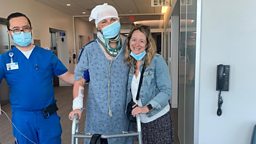
Getting to the US felt like one more hurdle crossed. The neurosurgeon was in the room within minutes of them arriving at the hospital, but was very realistic in terms of expectations – Robin was extremely ill.
“They said it was probably maybe two inches off completely taking the top of [Robin's] skull off"Liz
Liz was bombarded with medical jargon and brain injury terminology: “It was such a mental overload.”
Scans and X-rays revealed that Robin had a broken neck, nose, sinuses and eye socket. He had a major impact fracture on the right-hand side of his skull and one that ran almost the whole circumference of his head.
“They said it was probably maybe two inches off completely taking the top of your skull off,” Liz recalls.
He had multiple brain bleeds. On top of everything, they discovered he had pneumonia.
Doctors kept asking Robin to hold his hands up like he was balancing a pizza, as a way of monitoring him. Initially, his arms were level, but suddenly things changed.
“When my left arm started dropping, I did not perceive it in any way shape or form,” Robin recounts. “That's when I got rushed into surgery.”
“Something I was taught when I was very young in sailing, and it stayed with me forever, is control the controllables and don't really worry about the rest,” he says.
“At that point I was controlling the controllables, which was me. I could be as positive as I could be and try and get through it.”
An 'astonishing' turnaround
Robin was in surgery for around eight hours.
“You can see Robin coming back to life"Liz
“There's 15 very clever little metal plates that go across my head,” he states. “They'll be in there for life.”
It had gone to plan, but then Robin began to deteriorate. “Where all of those hematomas were, fluid started to accumulate and started to push my brain from one side to the other.”
Robin had something called a midline shift.
“He started getting personality changes, anger, aggression,” Liz recounts.
They put him in soft restraints because he kept trying to pull his wires out. “You thought that the CIA had abducted you.”
The doctor called Liz into a room. He told her to prepare for the worst.
By this time, her parents had flown out. She can remember her mum holding her hand, and her dad’s face when she told him the news.
“It was watching the reaction on his face.” The pain that she couldn’t see in herself, was mirrored in him. “I thought, ‘Oh God, this is horrible.’”
Then, they gave Robin a high dose of sodium, to try to drain the fluid from his brain. “Just loads and loads of salt,” he clarifies. “And it works.”
“You can see Robin coming back to life,” says Liz, “It's astonishing.”
'I've been very lucky indeed'
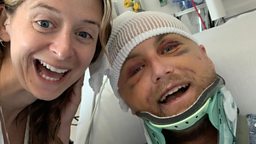
Robin had two more weeks in ICU, two more in hospital, and then he was able to return home. “To be able to sleep in the same bed again was amazing,” says Liz.
"We had the most incredible support"Liz
Robin was adamant that the wedding was going ahead: “I wasn't having that taken away from me.” They were married seven weeks later.
The pair are immensely thankful: “We had the most incredible support from friends, from family: financially, emotionally,” says Liz.
“We got everything we needed from the people around us and we are so lucky and grateful.”
Robin’s brain continues to repair.
“The acute healing period for a brain injury is two years, so we're still in that,” says Liz.
But there is nothing, cognitively, that’s causing Robin issues.
“My memory is not quite as good,” he admits. “You get occasional soreness across the head… but I've been very lucky indeed.”
Sharing 'hope' for others
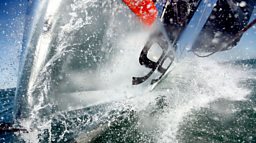
The event has given Robin a new view on life: “I want to have an impact. I want to do something that helps other people.”
"I want to do something that helps other people"Robin
He hopes talking about his experience will boost others recovering from traumatic brain injuries: “They might know there's hope at the other end of the tunnel and there's a fantastic life ahead of you.”
Now, he wants to race the Vendée Globe, to further raise awareness and inspire others. “It'll be my Everest… the absolute pinnacle of what I can do.”
Liz admits that the thought of it terrifies her, but he has her support: “This part isn't about me. It's something that Robin has always wanted to do since the moment we met.
"And I think that after having something so scary and life-altering happen to you, you should get to decide the things that you want to complete in your life.”
“It's incredibly tough,” Robin states. “You're out there by yourself and you've got to get through it, and that's part of the reason why I think it's so important… It gives people that message that even if it's tough and it's hard, there is something on the other side.”

More from Life Changing
-
![]()
Life Changing: I saved 30 people from a sinking ship – but I can’t swim
Lorry driver Larry O’Brien explains how he saved over 30 people from a sinking ferry.
-
![]()
Life Changing: I had debilitating agoraphobia – but a motorhome changed my life
Angela Tilley had severe agoraphobia, but one revelatory purchase changed everything.
-
![]()
Life Changing: I won £50,000 then gambled it away in seven days
When Stacey Goodwin got a new job, it triggered a destructive gambling addiction.
-
![]()
Life Changing: I was shot in the face and blinded - but stayed positive
Ed Stewart went blind after being shot, but a new - albeit risky operation - offered hope.
